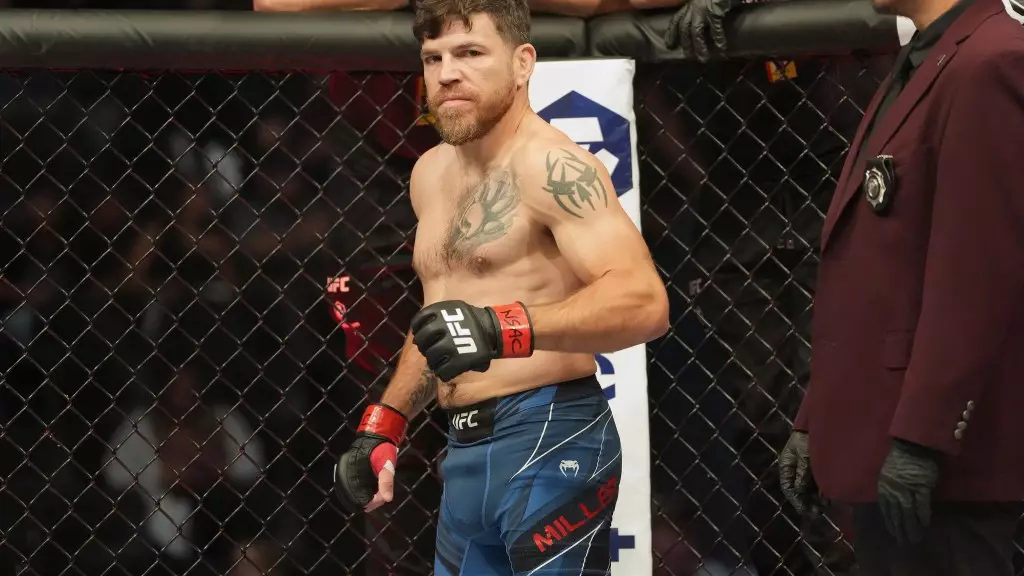Jim Miller stands as a pillar in the landscape of mixed martial arts, particularly in the Ultimate Fighting Championship (UFC). With an astonishing record of 38 wins, 18 losses, and a remarkable tenure comprising nearly 50 bouts within the UFC hexagon, one would assume that a fighter of his caliber would revel in the demands of his profession. Yet, lurking beneath the surface of this legendary athlete is a profound sense of imposter syndrome. At 41 years old, Miller candidly reveals that he grapples with the insecurity of feeling unworthy of making demands within the promotion he has served for more than a decade. This complex psychological aspect adds a layer of intrigue to his career — one that is adorned with unmatched accolades, significant milestones, and a palpable legacy.
Miller is not merely another fighter; he holds the UFC records for the most fights and the most wins, boldly stepping into the Octagon at historic milestones — UFC 100, UFC 200, and UFC 300. These accomplishments may suggest a sense of invincibility, yet he remains paradoxically humble. Describing his reluctance to make callouts or voice specific requests for fight conditions, Miller highlights a struggle that resonates with many athletes across different sports. It is a struggle between the accolades they possess and the self-doubt that can plague even the most accomplished individuals. For someone who has spent years perfecting his craft, it’s perplexing that he still views himself through a lens of uncertainty.
In an exclusive interview with MMA Junkie Radio, Miller notes, “My job is to fight, and that’s what I do. I’m not a matchmaker.” His insistence on focusing solely on fighting speaks to a deep-seated commitment to his role, as well as a possible fear of overstepping boundaries in an often cutthroat environment. Miller’s reluctance to assert himself emphasizes an inherent humility but raises questions about how athletes negotiate their worth in a demanding professional landscape.
Despite his vast experience, it is disheartening that Miller struggles with asserting the respect he has undoubtedly earned. Conversations with UFC personnel like Sean Shelby and Joe Rogan have reinforced his belief that he commands a level of respect among peers. However, he grapples with the notion of leveraging that respect to advocate for better fight exposures or favorable conditions, such as avoiding fights at the UFC Apex in favor of high-profile pay-per-view events. “I still have difficulty making those callouts,” Miller confesses, indicating that, irrespective of his accomplishments, the psychological barriers remain steadfast.
Miller’s career trajectory exemplifies a unique blend of traditional values and modern professional expectations. His decision to manage his own career negotiations contrasts with the trend where many fighters delegate these responsibilities. This old-school mentality, rooted in the belief that the fighter’s primary focus should be on the competition, raises pertinent questions: How does one balance respect with self-advocacy? Is there a threshold at which it becomes necessary to assert oneself, or does humility perpetuate a cycle of missed opportunities?
As he looks forward to the upcoming challenges in his career, Miller’s journey exemplifies the evolution of a fighter’s persona — one that is both steadfast and tumultuous. The fact that he continues to seek opportunities within the Octagon, raising his fight count to three in 2024, starkly points to a commitment that continues to flourish despite internal battles. He has seen considerable success on pay-per-view events, racking up a 15-6 record throughout his storied career filled with fight bonuses and accolades.
Ultimately, Miller’s candid revelations shine a light on a significant, yet often overlooked, aspect of professional sports: the psychological hurdles even the most accomplished athletes face. His journey not only reflects the complexity of an athlete’s persona but signals the importance of mental health and self-advocacy in a competitive field. As Jim Miller continues to lace up his gloves, the layers of his experience underscore a vital narrative — that the journey of a fighter is as much about conquering external challenges as it is about facing the inner demons of self-worth and recognition.

